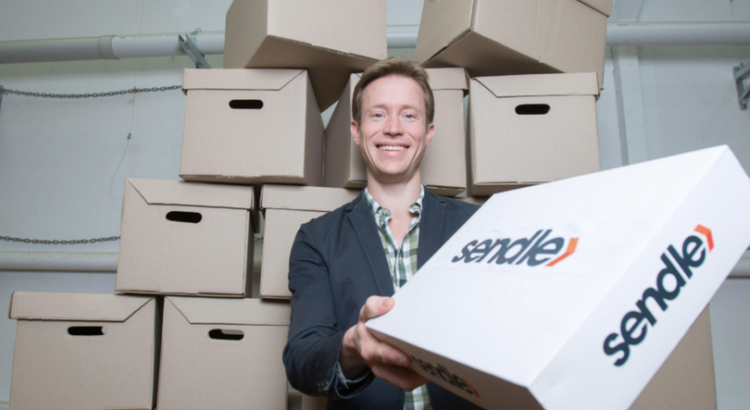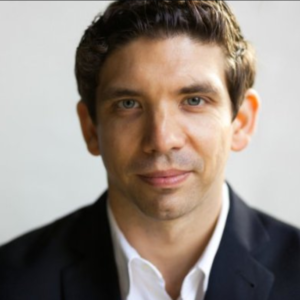In Techboard’s latest feature interview Robin Block speaks to James Chin Moody. James is the Founder & CEO of Sendle who were ranked fifth in the June Techboard Ranking. Sendle is a parcel delivery service that is changing the face of shipping in Australia by making door-to-door delivery affordable. Sendle has grown at near 20% per-month for the last two years and is the second high-growth technology startup James has founded since leaving his position on the executive team at CSIRO in 2012. Techboard Contributor Robin Block from MitchelLake sat down with James to gain his perspective on the disintermediated economy and understand the methods employed to accommodate Sendle’s rapid expansion. In this interview we gain insight into the importance of culture and bringing to bear both the intellectual and emotional brain to fully understand big decisions.
James: Sendle developed out of a business I founded in 2013 called TuShare. TuShare was an inversion of the traditional e-commerce model — instead of charging for products and providing free shipping, we facilitated clients sharing things for free and made money from shipping. What we quickly discovered was a need for a simple and effective logistics model. In building this infrastructure, and creating partnerships with bigger couriers, something curious started to occur — people started using the TuShare giving network for parcel delivery. We realised we had stumbled upon a monopoly. We could do door-to-door delivery cheaper than lining up at the post office. Australian Post has been doing a great job for 200 years, but I think it is time we bring some competition to that market. Sendle came out of looking at what this meant. It was clear that small businesses would benefit the most from this service and they have become our main focus in driving Sendle forward.
Robin: Disintermediation is important to your business model — how transferable do you think this outlook is to other industries.
James: Not only is this applicable to other industries, it is actively happening everywhere. It is actually becoming less possible to avoid — everything is turning into a stack of services. For example, we don’t have a server here, we use AWS, and AWS is itself a stack. The world is realising that the way forward is to be good at the things you’re good at. We are good at customer support — getting a parcel from point A to point B. We are good at providing services to small businesses and we are good at technology. Our focus is to excel in those categories and contract with others who are good at the services we need. Through bringing together this disintermediated network, we have created a disruptive force in the market by unlocking the capability to provide a service that is cheaper and more convenient.
This whole process can be looked at as an extension of specialisation and focus — things that have always been important to businesses. If you try and catch two rabbits, you end up catching neither. A more traditional example can be seen in how we had to close down TuShare in order to maximise the services we could provide through Sendle. Within one month, we had exceeded the volumes we were doing on TuShare after 18 months — and it just kept growing. We simply could not manage the TuShare giving network and Sendle simultaneously and excel at both. Making the choice to focus on Sendle is exactly what focusing on what you are good at entails. For small businesses, particularly, time is an important asset. Focus is the only way to move forward.
Robin: How have you approached the challenge of managing Sendle’s rapid growth?
James: It is my favourite problem. Jim Collins wrote a book called Good to Great in which he compared businesses to flywheels — meaning, as long as everyone pushes in the same direction, a business will speed up. However, if everyone pushes in different directions, the flywheel never goes anywhere. I would add that businesses are in fact several flywheels. You have a marketing flywheel, a product flywheel, etc. To be a great business, you have to make sure that you’re spinning the various flywheels at complimentary speeds. The key to managing this is dividing your attention appropriately. You might get one flywheel spinning around beautifully, but if you spend all of your time and attention there, all of a sudden another part of your business will fall apart. This is why teams and delegation are so important.
Most of the people at Sendle have worked for bigger companies. Craig, our co-founder, used to be with J. Walter Thompson. Our CTO worked in defence. We understand that it is a marathon, not a sprint. This is particularly true for a business like ours. Parcel delivery is sort of invisible when it works — but it never ceases. You have to create very scalable and repeatable processes in order to be a good courier service — that is a truism regardless of the level of growth you are experiencing.
Robin: With teams and delegation as a priority, company culture must be important — how do you approach managing those changes and developments with an expanding team?
James: We have something called the 5 Hs — humble, honest, happy, hungry and high achieving. It is always in that order because humility breeds honesty, which breeds positivity. Company culture truly relies on who you let in the door — who you are and what you celebrate.
We were Australia’s first technology B Corp, or benefit corporation. That means that we don’t act solely for shareholders, but all stakeholders in our business — we have a clear purpose that has a positive impact in the world. We also have to go through an accreditation process every two years. Our impact is that we facilitate A$100 million a year in small business e-commerce. Those are people and families that we are helping to support. We are the only 100% carbon neutral delivery service in Australia. We offset every single delivery that we make. We look for people that believe in these things.
There are certain ‘one-way’ decisions that you take as a business. Which market do you pursue? Who do you take investment from? Who do you employ? These are hard decisions to reverse. We try and put these things on a higher pedestal. I think there are actually three answers to every question: yes, no and hell yeah. For core cultural decisions, we try and get a hell yeah. Yes, I reckon, is your analytical mind. Hell yeah is when you bring emotions into it as well. For big things, you have to bring your full self to the decision making. On paper, you can think something looks like a good idea. But, if your emotional brain — which is actually much better at spotting patterns and things that might be wrong — remains unconvinced, you shouldn’t move forward. The best ideas come from discussion out in the open. I think it is simply good business sense, and common sense to identify the things that really matter and make sure that you have done your due diligence.
Robin: What do you see in the future for Sendle — are you concerned about the entrance of Amazon into the Australian market?
James: I think Amazon will ultimately be good for us because it will be good for our customers, at least in the short to medium term. Most of our customers sell online and Amazon will lift that entire marketplace by making people more familiar and comfortable with online shopping. Some big retailers are going to be in trouble — but that isn’t our main customer base. Our customers are all small to medium enterprises that will still need to send stuff.
Our main marketing strategy is to deliver on quality, ease and price points. We are a simpler, more reliable and more affordable solution. Small businesses talk to small businesses. I think that if you have a monopoly and wrap it in a habit, it can become invisible. We are showing people that they have options. We have grown because of the quality of what we do. I think of business growth in terms of the next value creation milestone. This allows you to align your business plan and your capital strategy. Fundraising is basically about getting from one milestone to the next. This allows you to go into fundraising meetings and say ‘look at what I said I was going to do and look at what I did.’ That creates confidence.
Technological change is never linear. I think that as humans we often fall into a trap of linear thinking. In reality, technological change is more like an S-curve — nothing and then a flip. What I think is happening now is that we are starting to get more tipping points, closer and closer together. Self-driving cars, AI, advances in medicine. But these changes are everywhere. In many parts of the world, renewables are now cheaper than coal. All of these shifts are just happening.
The sign of a great business is being able to look at this ever evolving landscape and engage with it while remaining focused. A growing business is going to end up with lots of opportunities. Focus is about sorting and testing — not just seeing the opportunity and asking how do I move on that, but looking to see which is the best one to pursue. You need to test things. This is what is meant by ‘agile’ — get it out, iterate and learn. We try and live by those values. The best thing you can do for a business is get customers because customers will tell you what works and what doesn’t. From there, you need to learn and build. It doesn’t come back to a single thing — it is a constant process of looking at things and looking at what you can learn.
View Sendle’s Website
View Sendle’s Techboard Profile which includes details of Sendle’s Techboard Rank, news, milestones and funding events since Techboard began tracking Sendle’s progress.
This is the second interview for Techboard by our friend Robin Block who has recently joined Techboard as a contributor. Robin’s first interview was with Bruce Buchanan from Rokt. Robin Block is Head of Engagement at the MitchelLake Group in Sydney. Robin explores the human stories behind digital transformation and how they are changing the future of business.
Jetstar to ROKTstar – Techboard talks to Bruce Buchanan CEO of Sydney Startup ROKT

